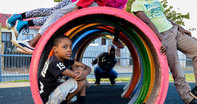
Our Nation
The stories of everyday people of South Africa are as important to tell as the stories of our leaders. The average citizen forms the backbone of our country and enhances its history, culture and social science within society. South Africa is home to over 55 million people, and these people all have bittersweet narratives that form South Africa’s unique and beautiful humanity.
South Africa Online ® showcases a range of stories from the often silent majority of South Africa - the everyday citizen, surviving and thriving, working within their communities to better their lives and those of others. Stories of unique women, children and men are told that fully embody the beauty, hardships and triumphs of ordinary South Africans.

Women of South Africa are a unique kind of wonderful - they are strong, beautiful and resilient in their everyday lives. South Africa has re...
more
South Africa’s public health system is a network of medical care across the country, providing access to treatment for all South Africans....
more
South Africa’s cuisine is as diverse and colourful as its rainbow nation. With influences from the indigenous population, along with the D...
more
Food security is about so much more than just how much food we grow. 'Urban food security is the emerging development issue of this century,...
more
The Food Dialogues were conceived of and produced by the Oranjezicht City Farm (OZCF) as a 10-part series of talks on the food system in Cap...
more
Piet and Hendrik are farm labourers, they live on the farm where they work and through them, I have got to know other workers in the valley ...
more
After the first democratic elections in 1994, the National Symbols Commission took the responsibility of asking the South African public wha...
more
On 16 December 1995, for the first time, South Africa celebrated a Day of Reconciliation whereby both the Afrikaner and liberation struggle ...
more
They realised their parents, teachers and school boards had been unable to persuade the apartheid government to change its iniquitous policy...
more
South Africa is often regarded as an entrepreneurial leader in Sub-Saharan Africa. We have made significant progress in overcoming our socia...
more
Recreational sports in South Africa have long entertained citizens with organised sporting events, friendly group socialisation and outdoor ...
more
South Africa is a playground for any and all holiday-makers - it’s the ideal country to visit if you are a thrill-seeker looking for adven...
more
 Women of South Africa are a unique kind of wonderful - they are strong, beautiful and resilient in their everyday lives. South Africa has re...
Women of South Africa are a unique kind of wonderful - they are strong, beautiful and resilient in their everyday lives. South Africa has re... South Africa’s public health system is a network of medical care across the country, providing access to treatment for all South Africans....
South Africa’s public health system is a network of medical care across the country, providing access to treatment for all South Africans.... South Africa’s cuisine is as diverse and colourful as its rainbow nation. With influences from the indigenous population, along with the D...
South Africa’s cuisine is as diverse and colourful as its rainbow nation. With influences from the indigenous population, along with the D... Food security is about so much more than just how much food we grow. 'Urban food security is the emerging development issue of this century,...
Food security is about so much more than just how much food we grow. 'Urban food security is the emerging development issue of this century,... The Food Dialogues were conceived of and produced by the Oranjezicht City Farm (OZCF) as a 10-part series of talks on the food system in Cap...
The Food Dialogues were conceived of and produced by the Oranjezicht City Farm (OZCF) as a 10-part series of talks on the food system in Cap... Piet and Hendrik are farm labourers, they live on the farm where they work and through them, I have got to know other workers in the valley ...
Piet and Hendrik are farm labourers, they live on the farm where they work and through them, I have got to know other workers in the valley ... After the first democratic elections in 1994, the National Symbols Commission took the responsibility of asking the South African public wha...
After the first democratic elections in 1994, the National Symbols Commission took the responsibility of asking the South African public wha... On 16 December 1995, for the first time, South Africa celebrated a Day of Reconciliation whereby both the Afrikaner and liberation struggle ...
On 16 December 1995, for the first time, South Africa celebrated a Day of Reconciliation whereby both the Afrikaner and liberation struggle ... They realised their parents, teachers and school boards had been unable to persuade the apartheid government to change its iniquitous policy...
They realised their parents, teachers and school boards had been unable to persuade the apartheid government to change its iniquitous policy... South Africa is often regarded as an entrepreneurial leader in Sub-Saharan Africa. We have made significant progress in overcoming our socia...
South Africa is often regarded as an entrepreneurial leader in Sub-Saharan Africa. We have made significant progress in overcoming our socia... Recreational sports in South Africa have long entertained citizens with organised sporting events, friendly group socialisation and outdoor ...
Recreational sports in South Africa have long entertained citizens with organised sporting events, friendly group socialisation and outdoor ... South Africa is a playground for any and all holiday-makers - it’s the ideal country to visit if you are a thrill-seeker looking for adven...
South Africa is a playground for any and all holiday-makers - it’s the ideal country to visit if you are a thrill-seeker looking for adven...